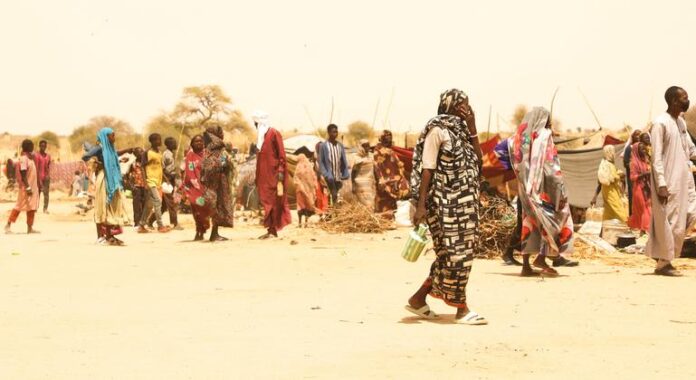The “Shared Lives, Shared Future” exhibition features stories from nearly 200 countries and reflects how the spirit and mission of the United Nations has evolved over time.
From humanitarian aid and education to development and sustainability, it features real-life stories of individuals and communities whose lives have been transformed by the UN mission.
Here are some of their personal thoughts.
Mariam dreams of the return of UNRWA schools
Mariam, former student from the occupied Palestinian territory
Before the current conflict, UNRWA the United Nations agency that helps Palestinian refugees has operated schools throughout the Gaza Strip, providing education to around 300,000 children. A daughter, Mariam, who studied in a UNRWA before the war, said: “We miss the UN schools we went to. I want life to go back to the way it was.”
Today, UNRWA, in cooperation with other UN agencies and partners, is providing lifesaving assistance amid a devastating humanitarian crisis.
Radwa, a Sudanese refugee, makes humanitarian aid a life project
Chad. Thousands of Sudanese refugees continue to flee across the border
Since the outbreak of war in Sudan in April 2023, nearly 12 million people have been forcibly displaced within and outside the country, including 878,000 fleeing to neighboring Chad alone.
The United Nations Refugee Agency (UNHCR) provides them with shelter, food, medical care and education, as well as safe resettlement from insecure border areas.
Among them is Radwa, who fled Sudan to Chad. Combining her entrepreneurial skills with financial assistance from UNHCR, she started a small home-based baking business in the Farchana refugee camp.
“I like to help people because everyone needs support. That’s why I support my fellow refugees so that we can grow together and no one is left behind. It is important to stand by our brothers and sisters, to help them heal,” she said.
Young Yemeni girl escapes early marriage thanks to UN support
At fifteen, Afaf was faced with an impossible choice to help her family: find a job or marry a 40-year-old man.
“At 15, I was pressured to get married, but the UN helped me get through it,” she said.
In a “safe space” supported by the United Nations Population Fund (UNFPA), she received advice and training. The marriage was ultimately annulled.
Lebanese firefighter faces danger with UN equipment
As part of its emergency response programs, the United Nations Development Program (UNDP) has provided essential equipment to firefighters in Beirut, in the Lebanese capital, making firefighters’ missions safer and more efficient.
Layal, herself a firefighter, said: “The new equipment provided by the UN greatly improves our safety and preparedness. »
From drugs to cabbage fields
With the support of the United Nations Office on Drugs and Crime (UNODC), Zahoor and thousands of other Afghan farmers transitioned from opium to legal agriculture, transforming the land into a source of hope and sustainable income. It also helps make the world safer from drugs.
With the support of the United Nations Office on Drugs and Crime (UNODC) Afghan farmer Zahoor and thousands of others have transitioned from opium cultivation to legal cultivation, transforming their land into a source of hope and sustainable income, also contributing to a safer, drug-free world.
“With the support of the UN, I moved from growing opium to growing cabbage. I received training in modern agriculture and was given pesticides to protect my crops,” Zahoor said.
Eco-industrial parks, a UN partnership for sustainable production
Manager of Liudmyla Ukraine Eco-Industrial Park
Eco-industrial parks bring businesses together to improve their performance and sustainability. The United Nations Industrial Development Organization’s Global Eco-Industrial Parks Program (UNIDO) supports these parks throughout Ukraine with policy support, capacity building and technical assistance.
Liudmyla, director of an eco-industrial park in Ukraine, told the UN that “since 2020, we have been actively cooperating with the UN on energy-saving projects, which has helped us reduce our gas and electricity consumption and move towards more energy-efficient production.”
Innovative Water Solutions in Malaysia
Rabiah works at the Johor Ports Authority, which partnered with the UN for Trade and Development (UNCTAD) to design and implement a water-saving system. UNCTAD’s global network of certified port managers advances best practices, strengthens South-South cooperation and drives progress towards the Sustainable Development Goals (SDGs).
Rabiah works at the Johor Port Authority in Malaysia, which has partnered with the United Nations Conference on Trade and Development (UNCTAD) to design and implement a water saving system.
The UNCTAD Port Management Network promotes best practices, supports South-South cooperation and fosters progress towards Sustainable Development Goals.
“With the support of the UN, we have implemented a solution that saves 10 million liters of fresh water every year,” Rabiah reported.
The exhibition will also be presented in various locations around the world and is accessible online.
Originally published at Almouwatin.com







